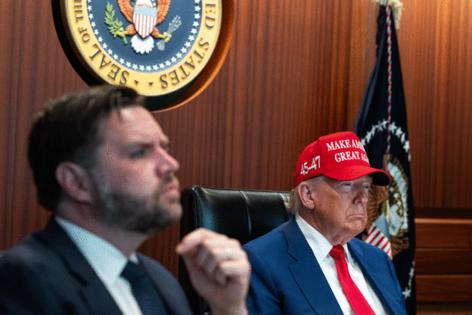Hal Brands: Trump is opening a new chapter in US foreign policy
Published in Op Eds
Nearly six months into Donald Trump’s presidency, a Trump Doctrine is coming into view. Contrary to the fears of his critics, and the hopes of some admirers, Trump is no isolationist. And contrary to those who claim Trump is simply a marvel of ac hoc-ery and inconsistency, there is a distinctive pattern to the policies he has pursued.
This Trump Doctrine emphasizes using American power aggressively — more aggressively than Trump’s immediate predecessors — to reshape key relationships and accrue U.S. advantage in a rivalrous world.
In doing so, Trump has blown up any talk about a post-American era. Yet he has also raised troubling questions about whether his administration can wield America’s outsized influence effectively and keep it strong.
The isolationist label has long followed Trump, but it’s never accurately described an idiosyncratic man. Yes, Trump disdains core elements of U.S. globalism, from the international trade system America established to its promotion of democratic values and its defense commitments around the world.
Yet Trump has also argued that America should assert itself more forcefully in a cutthroat world. And today, as Trump pursues a capacious view of presidential power at home, he is offering an equally ambitious conception of American power abroad.
Trump rails against long, costly nation-building efforts. But he has nonetheless waged two short, sharp Middle Eastern conflicts: one to deter Yemen’s Houthis from attacking U.S. forces and Red Sea shipping, the other to roll back the Iranian nuclear program. Several U.S. presidents pledged to use force to keep Tehran from crossing the nuclear threshold; Trump really did it. That’s not the policy of a man in thrall to the Republican Party’s Tucker Carlson wing.
Meanwhile, Trump started trade wars against dozens of countries, in hopes of reshaping the international economy. He deployed diplomatic leverage, and explicit threats of abandonment, to remake the transatlantic bargain by getting European allies to spend much more on defense. Trump also wielded America’s innovation power — its role in designing high-end semiconductors — to bring Saudi Arabia and the UAE into Washington’s tech bloc and make them partners in his push for “AI dominance.”
Closer to home, Trump used veiled threats to pry Panama out of China’s Belt and Road Initiative. He has demanded territorial concessions from Panama, Denmark and Canada. At the same time, Trump touts his Golden Dome missile shield, meant to protect the homeland and give America greater freedom of action against its foes.
This isn’t standard-issue, post-1945 American internationalism: It’s hard to imagine prior presidents telling allies to yield their land. But neither is it a retreat into Fortress America. And by applying American power in such energetic, omnidirectional fashion, Trump has revealed much about the true state of world affairs.
Policy journals brim with articles about American decline and the advent of multipolarity. But Trump, in his inimitable way, has reminded so many countries where power really lies. For example: The strike on Iran demonstrated America’s unique global military reach and its ability, together with Israel, to reshape the Middle East while relegating Russia and China — nominally Iran’s allies — to the sidelines.
Trump’s key insight is that the world’s sole superpower has more muscle than commonly understood. Yet the Trump Doctrine nonetheless suffers from three big problems.
First, its exercise of power is weakened by its dearth of strategy. Trump’s trade war got off to a farcical start because he failed to consider how sky-high tariffs might wreck the U.S. economy — a real-time discovery that forced a rapid, humiliating climb-down. A president who privileges the art of the deal over intellectual consistency sometimes pursues contradictory policies: Trump’s tariffs against Indo-Pacific allies erode their prosperity and make it harder for them to spend more on defense.
Second, a president who sometimes struggles to distinguish friends from enemies sometimes fails to point U.S. power in the right direction. Trump delights in taking aim at U.S. allies. He has been more reluctant to confront Russia, even as Vladimir Putin makes a mockery of Trump’s desire for peace in Ukraine — and even though Putin’s war economy is increasingly vulnerable to the commercial and financial coercion that Trump so often threatens to employ.
Third, the best presidents build U.S. power for the future, but Trump risks depleting it instead. Maybe the One Big Beautiful Bill will juice the economy — or maybe it will lock in structural deficits that constrain defense spending and growth. Slashing foreign aid saves little money but squanders U.S. global influence; the war on universities threatens the research ecosystem that underpins America’s economic and military might. Moreover, a policy of tough love toward allies could turn into mutually destructive hostility, and a superpower that regularly coerces its friends could wreck the soft power that lubricates key relationships.
Trump revels in using U.S. power, but he doesn’t quite understand where it comes from. That’s the central irony, and fundamental weakness, of the doctrine guiding his administration today.
_____
This column reflects the personal views of the author and does not necessarily reflect the opinion of the editorial board or Bloomberg LP and its owners.
Hal Brands is a Bloomberg Opinion columnist and the Henry Kissinger Distinguished Professor at Johns Hopkins University’s School of Advanced International Studies.
_____
©2025 Bloomberg L.P. Visit bloomberg.com/opinion. Distributed by Tribune Content Agency, LLC.

























































Comments